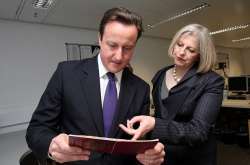UK PM David Cameron to resign on Wednesday, Theresa May to succeed
London: Theresa May is all set to become the next Prime Minister of the United Kingdom as incumbent David Cameron today said that he would offer his resignation to Queen Elizabeth II on Wednesday.

London: Theresa May is all set to become the next Prime Minister of the United Kingdom as incumbent David Cameron today said that he would offer his resignation to Queen Elizabeth II on Wednesday.
Earlier, Andrea Leadsom, one of the two Conservative candidates to be British Prime Minister, withdrew from the running on Monday, leaving Home Secretary Theresa May as the only remaining candidate.
Leadsom said she concluded she does not have "sufficient support" to win adding that the country needs certainty, not a nine-week leadership race.
Prime Minister David Cameron welcomed the development and said he would offer his resignation to Queen Elizabeth II on Wednesday after attending a final session of Prime Minister's Questions in the House of Commons.
Standing outside 10 Downing St. Cameron said: "We will have a new prime minister in that building behind me by Wednesday evening."
Cameron announced his resignation after failing to convince voters to remain in the EU in a June 23 referendum. May had campaigned tepidly for Britain to remain but on Monday sought to reassure those who voted "leave" that she would respect their wishes.
May will become Britain's second female prime minister, after Margaret Thatcher. Thatcher, a Conservative, governed the country from 1979 to 1990. May will be invited to form a government by the queen on Wednesday. The monarch's role is ceremonial, but part of the custom of changes of government.
In a ballot last week, Conservative lawmakers chose Home Secretary Theresa May and Energy Minister Andrea Leadsom to fight a runoff contest for leadership of Britain’s governing party.
May received 199 votes in a ballot of Conservative members of Parliament, while Leadsom received 84. Justice Secretary Michael Gove got 46 votes and was eliminated from the race.
Some 150,000 party members were due to choose between them in the coming weeks, and the result would have been announced in September.
The new leader will be responsible for leading Britain’s exit negotiations with the 28-nation EU as well as helping to steady the country’s government and economy, which has been deeply shaken by markets’ reaction to the EU vote.
May supported the losing “remain” side in the EU vote but said that she was the best person to unite a party that – like the country – is divided over the referendum result.
May, 59, is one of the most experienced ministers in Cameron's Cabinet, serving in the notoriously difficult job of home secretary, akin to the interior minister's post in other countries, for six years.
Like Cameron, she comes from the pro-EU wing of the party, but leading anti-EU Conservatives quickly rallied around her Monday. Gove, the justice secretary, said "she has my full support as our next prime minister," while former London mayor Johnson said May would "provide the authority and the leadership necessary to unite the Conservative Party and take the country forward."
At her campaign launch, May tried to reassure supporters of a British exit, or Brexit, that she would respect their decision.
She said "Brexit means Brexit" and promised that as leader she would not attempt to stay in the EU or "rejoin it by the back door."
Leadsom's decision to quit came after the weekend uproar over her comments about the role of motherhood in politics. She at first defended, then apologized for, an interview in which she said that being a mother "means you have a very real stake in the future of our country."